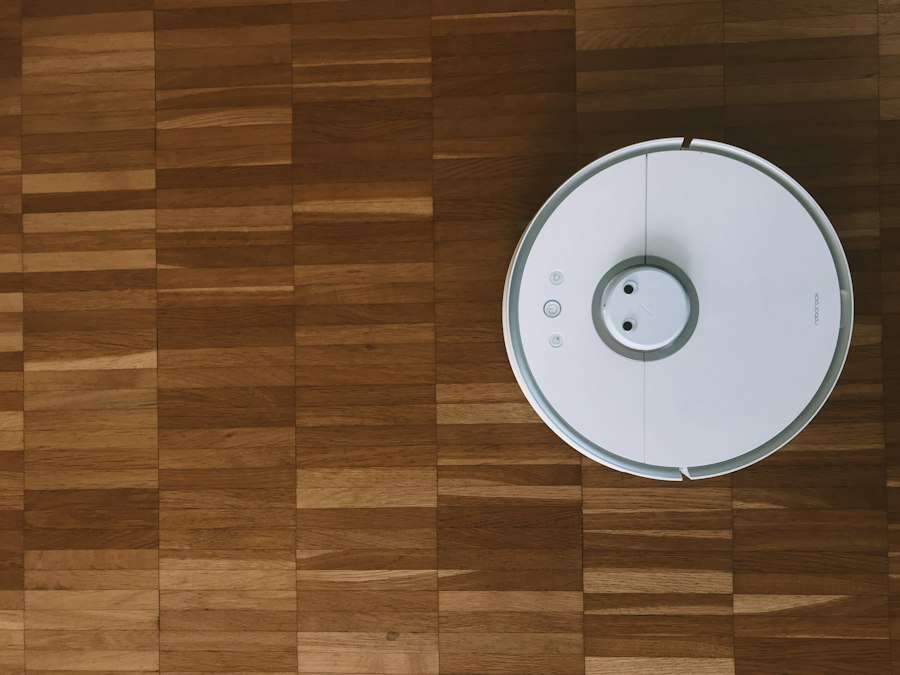The flooring industry has seen significant advancements in robotics in recent years. From automated machines that can lay tiles or carpets with precision to robotic vacuum cleaners that can efficiently clean large areas, robotics has revolutionized the way flooring businesses operate. Investing in robotics can provide numerous benefits for flooring businesses, including increased efficiency, improved productivity, reduced labor costs, and enhanced accuracy.
How Robotics Can Improve Efficiency and Productivity
One of the key advantages of robotics in the flooring industry is its ability to improve efficiency and productivity. For example, robotic machines can perform tasks such as cutting, shaping, and laying tiles or carpets much faster and with greater precision than human workers. This not only reduces the time required to complete a project but also minimizes errors and rework. Additionally, robots can work continuously without getting tired or needing breaks, leading to increased productivity.
Furthermore, robotics can automate repetitive and mundane tasks that would otherwise require significant manual labor. This allows human workers to focus on more complex and value-added activities, such as design or customer service. By automating these tasks, businesses can streamline their operations and make better use of their resources.
The Benefits of Automating Your Flooring Processes
Automation is another key aspect of future-proofing your flooring business. Automated flooring processes involve using machines and technology to perform tasks that were previously done manually. This can include tasks such as measuring and cutting materials, mixing adhesives, or even cleaning and maintenance.
One of the main benefits of automation is the reduction in labor costs. By replacing manual labor with machines, businesses can save on wages, benefits, and training expenses. Additionally, automation can improve accuracy and consistency, leading to higher-quality results. Machines can perform tasks with precision and repeatability, minimizing errors and rework.
Automation also allows for better control and monitoring of the production process. With automated systems, businesses can track and analyze data in real-time, enabling them to identify bottlenecks or inefficiencies and make necessary adjustments. This leads to improved decision-making and more efficient use of resources.
How Robotics Can Help You Meet Changing Customer Demands
The flooring industry is constantly evolving, with changing customer demands and preferences. Customers today are looking for more personalized and unique flooring options, as well as eco-friendly and sustainable materials. They also expect faster turnaround times and higher-quality results.
Robotics can help businesses adapt to these changing demands by providing greater flexibility and customization options. For example, robotic machines can be programmed to create intricate designs or patterns on tiles or carpets, allowing for more personalized flooring options. Additionally, robotics can enable businesses to work with a wider range of materials, including eco-friendly alternatives.
Furthermore, robotics can help businesses meet customer expectations for faster turnaround times. With automated processes, tasks can be completed more quickly and efficiently, reducing lead times. This allows businesses to take on more projects and deliver results in a timely manner.
The Role of Robotics in Creating Safer Work Environments
Safety is a major concern in the flooring industry, as workers are often exposed to hazardous materials and working conditions. Robotics can play a crucial role in creating safer work environments by taking over dangerous or physically demanding tasks.
For example, robotic machines can handle heavy materials or operate in confined spaces where it may be unsafe for human workers. This reduces the risk of injuries and accidents. Additionally, robots can be equipped with sensors and cameras to detect potential hazards and alert workers to take necessary precautions.
Moreover, robotics can help reduce the risk of repetitive strain injuries (RSIs) and other musculoskeletal disorders (MSDs) that are common in the flooring industry. By automating repetitive tasks, businesses can minimize the physical strain on workers and improve their overall well-being.
The Impact of Robotics on Quality Control and Consistency

Quality control and consistency are critical factors in the flooring industry. Customers expect high-quality results that are consistent across different projects. Robotics can significantly improve these aspects of flooring production.
Robotic machines can perform tasks with precision and repeatability, ensuring consistent results every time. This eliminates variations caused by human error or fatigue. Additionally, robots can be programmed to perform quality checks during the production process, identifying any defects or inconsistencies and making necessary adjustments.
Furthermore, robotics can enable businesses to collect and analyze data on quality control metrics in real-time. This allows for proactive identification of potential issues and continuous improvement of processes. By maintaining high-quality standards, businesses can enhance their reputation and customer satisfaction.
The Future of Flooring: Trends and Predictions
The flooring industry is constantly evolving, driven by changing trends and advancements in technology. One of the key trends in the industry is the increasing demand for sustainable and eco-friendly flooring options. Customers are becoming more conscious of their environmental impact and are seeking materials that are renewable, recyclable, or made from recycled materials. Robotics can play a crucial role in meeting this demand by enabling businesses to work with a wider range of sustainable materials and reducing waste through precise cutting and shaping.
Another trend in the flooring industry is the growing popularity of smart flooring solutions. Smart flooring incorporates technology such as sensors, actuators, and connectivity to provide additional functionalities such as temperature control, energy efficiency, or even interactive features. Robotics can contribute to the development of smart flooring by integrating sensors and actuators into the manufacturing process, allowing for the creation of more advanced and innovative products.
Predictions for the future of flooring and the role of robotics include further advancements in automation and artificial intelligence. As technology continues to evolve, robotics will become more sophisticated and capable of performing complex tasks. This will lead to increased efficiency, productivity, and customization options in the flooring industry.
How to Choose the Right Robotics Solution for Your Business
When choosing a robotics solution for your flooring business, there are several factors to consider. First, you need to assess your specific needs and requirements. What tasks do you want the robots to perform? Do you need a fully automated system or just specific machines to assist with certain tasks? Understanding your needs will help you determine the type and level of automation required.
Second, you should consider the scalability and flexibility of the robotics solution. Can it be easily integrated into your existing processes? Is it adaptable to future changes or advancements? It’s important to choose a solution that can grow and evolve with your business.
Third, you need to evaluate the cost-benefit ratio of investing in robotics. While robotics can provide numerous benefits, it’s essential to assess whether the return on investment justifies the initial costs. Consider factors such as labor savings, increased productivity, and improved quality control when calculating the potential benefits.
Lastly, you should research and compare different robotics solutions available in the market. Look for reputable manufacturers or suppliers that have a track record of delivering reliable and high-quality products. Consider factors such as performance, reliability, ease of use, and customer support when making your decision.
Why Robotics is the Smart Choice for Future-Proofing Your Floors
In conclusion, future-proofing your flooring business is crucial to stay competitive in an ever-evolving industry. Investing in robotics can provide numerous benefits, including improved efficiency, productivity, safety, and quality control. Robotics can also help businesses meet changing customer demands and adapt to emerging trends. By choosing the right robotics solution for your business, you can ensure the longevity and success of your flooring operations. So, embrace the power of robotics and future-proof your floors today.

